Top 10 AI sales tools
Artificial intelligence (AI) sales tools are changing the game. It’s time to say goodbye to repetitive tasks, wasting time on poor-quality leads, or being overwhelmed by sales administration.
Instead, sales teams are using AI to their benefit. For example, lead scoring AI to help them focus efforts on accounts that are likely to convert, or AI sales tools that automate repetitive tasks like updating the CRM.
Now, people can focus on customer relationships and closing deals, where human interaction matters the most. In this article, I compare the best AI sales tools, including their functions, pros and cons, key AI features for sales teams, and who the tool is best for. I’ve also included my direct experience with many of them.
What are AI sales tools?
AI sales tools are tools powered by, or use, AI to help sales teams
- Work smarter
- Work efficiently
- Close more deals
- Allocate resources to the highest-quality leads
- Automate tasks
These days, AI for sales teams is found in most software and tools, and usefully, you can integrate tools to streamline processes and automate tasks between tools.
How to choose the right AI sales tool for your business
Integrating AI into your sales workflow is a big deal, and many options exist. It’s important not to get overwhelmed by the choices because there are benefits.
Consider your sales goals and what each tool brings to them. Start simply with AI that addresses the issues you most want to resolve.
Complete a cost analysis and consider the money AI tools will save and the revenue increases thanks to tools’ functionality and streamlined workflows. Sometimes, the expensive solutions are more efficient and offer greater savings overall.
The best AI sales tools for 2025
I’ve created a shortlist of the ten best AI sales tools. Within this shortlist, I’ve included a description, the pros and cons, who they’re best for, and highlighted key AI features.
I recommend reading about these tools with your goals in mind. When you’re adopting a new AI, and especially if you’re adopting AI into your sales process for the first time, you want the tool to be so useful that you’re sure to get buy-in from sales team members and company stakeholders.
1. Jotform AI Agents
Jotform’s AI Agents is the most reliable no-code AI sales tool, designed to help sales teams automate and personalize customer interactions. You can train Jotform agents using your knowledge base, so the AI agent will deliver customer service like a team member.
You can manage all the agents in one central dashboard, and deploy your agents across multiple channels, including
- Telephone calls and SMS
- Website
- Facebook Messenger
I recently created my first AI agent and embedded it into my WordPress website in minutes. The AI agent I made was a feedback agent. The goal was to encourage users to engage with the chatbot so I could review the communications and determine what users wanted to see from my site and which products they were most interested in.
Developer: Jotform
Best for: Customer support and live chat, centralized management of AI agents in one dashboard
Pros: Jotform provides AI agent templates for sales, including Sales Order AI Agents; no-code solutions mean anyone can easily build, train, and embed AI agents; integrations with popular apps like Slack and Google Calendar
Cons: If you’re new to Jotform, there may be a learning curve; it takes time to become fully familiar with the platform, especially as there are other features you’ll want to explore, like contract management; success of your AI agent depends on how well it’s trained
Key features: 24/7 customer support with the Customer Support AI Agent; live chat via the Live Chat AI Agent supports customers until assistance from a human agent is required
Plans/pricing: Get started with up to five AI agents for free. Then choose from tiered packages:
- Bronze: $34 per user per month, billed annually
- Silver: $39 per user per month, billed annually
- Gold: $99 per user per month, billed annually
G2 Rating: 4.7
2. HubSpot Sales Hub
HubSpot is one of the largest AI customer relationship management (CRM) tools. It serves businesses of all sizes, including startups. As a leading CRM, the platform offers many tools and AI solutions designed to streamline sales processes, many of which are free.
Pros: Generous free packages and a solution that can grow with your business; a well-populated knowledge base so you can find solutions to any problem using the platform; integrated AI tools for just about any sales need; the platform has been around for years and is very well know
Cons: High cost of advanced features; potential for overwhelm and a steep learning curve; certain advanced functionalities are exclusive to higher-tier plans, potentially limiting the capabilities for users on the free plan
Key features: Predictive lead scoring that utilizes AI to assess and prioritize leads based on their conversion likelihood; predictive sales forecasting that uses historical deal data to forecast the revenue sales teams are likely to close; sales automation; generative AI used throughout the platform; automated sales notifications
Plans/pricing: Sales teams will most likely want HubSpot’s Sales Hub, which you can start using for free; once you’ve exhausted the free account, you can choose from tiered pricing packages:
- Starter: $20 per seat per month
- Professional: $100 per seat per month
- Enterprise: $150 per seat per month
Ratings: 4.4
Did you know?
Jotform integrates with HubSpot to automatically capture leads, add contacts to your HubSpot lists, and create deals for contacts.
3. ChatGPT
Your sales team creates valuable content daily, but they’re probably not getting the mileage out of it. Every thoughtful email response or call summary can be repurposed into content that educates, reassures, and nurtures your prospects. ChatGPT makes light work out of identifying and writing new content from what exists.
Now, instead of just sending one email and giving one person visibility of my responses, I like repurposing emails into several LinkedIn posts. One email can keep my LinkedIn updated with posts for a week, and when the posts address real customer or prospect queries, I know they’re relevant to my target audience.
I simply
- Copy my email
- Remove any sensitive data
- Ask ChatGPT to identify the key points that could become a LinkedIn post
- Ask ChatGPT to write the content
- Heavily edit the content and schedule it for posting on LinkedIn
Developer: OpenAI
Best for: General tasks, repurposing content
Pros: Save time by using generative AI to do some of the thinking and transform existing content, such as emails or blogs, into new formats; it has multiple uses, for example, to create buyer personas, develop ideas, write anything, generate images, and more; excellent free version
Cons: Editing is still required, as it is for any generative AI; ChatGPT is more general rather than being sales-specific
Key features: Generative AI is an excellent writing assistant; generate unique images to save using stock
Plans/pricing: You can start using it for free, which makes it a no-brainer; however, if you want more advanced AI, you’ll need to invest $20 monthly
G2 rating: 4.7
4. Avoma
Avoma is a powerful AI meeting assistant and conversation intelligence platform that helps sales teams automate note-taking, analyze customer conversations, and improve their pitches.
Avoma is especially useful for startups and scaleups because it has modular pricing. Avoma markets its tool as an all-in-one solution, with the benefit that you don’t have to take everything at once.
Pros: Strong AI-powered tools all within one tool; automated summaries and action items make handoffs and follow-ups seamless; modular billing enables you to add products as needed; more than 30 integrations; AI-powered meeting performance scoring assigns scores to meetings based on criteria set by you; intelligent topic detection saves you from having to listen to the entire meeting to get to key details; live bookmark the key moments in your conversations; keyword tracker to identify trends across categories
Developer: Avoma Inc
Best for: Startups and scaleups
Cons: Might do too much for small teams, though you don’t need to jump in and buy everything with Avoma which means the tool can grow with you; can overwhelm new users due to learning curve
Key features: AI meeting assistant for note-taking and follow-up emails; conversation intelligence for automated call scoring and personalized coaching; revenue intelligence that includes AI-powered deal risk alerts; instant meeting bookings
Plans/pricing: Pricing for Avoma varies depending on needs, but you can try for free and you don’t need to put your credit card details in to start; after that, you’ll need to pay for tiered options:
- Startup: $19 per user per month
- Organization: $29 per user per month
- Enterprise: $39 per user per month
- Additional features: $29 per month
G2 rating: 4.6
5. Sybill
Sybill is a must-use in my sales tools. It’s particularly useful in meetings. Once you create an account with Sybill, the AI notetaker will attend any meeting you’re invited to. The notetaker is fantastic, and I find it to be very accurate. The AI creates an actionable to-do list with accountability. It can be integrated with Slack or other software, giving everyone within the channel visibility of their next steps.
This functionality is especially useful in sales meetings because the team can switch off from things like note taking and thinking about what they have to do after the meeting, and instead give their undivided attention to the prospect or client.
Developer: Sybill
Best for: analyzing call data, extracting product insights or to-do lists from calls, sentiment tracking
Pros: Accurate meeting summaries; integrations with other tools; sales-focused notetaking software
Cons: Zoom dependency for some features, such as behavioral cues and analysis; has fewer integrations than competitors
Key features: Sybill AI records conversations and turns them into actionable to-do lists or summaries; AI recognizes engagement from participants and speech using sentiment analysis; CRM automation; generative AI creates a follow-up email from the meeting
Plans/pricing: Sybill has various user paid plans:
- Essentials: $19 per user per month, billed annually
- Business: $79 per user per month, billed annually
- Enterprise: Custom pricing
G2 rating: 4.8
6. Dreamdata
Dreamdata is a B2B revenue attribution platform that is brilliant at helping sales teams understand the sales pipeline and customer journey, including where the lead came from, who the lead is, and the touchpoints that contributed to conversions.
My co-founder and I love Dreamdata. We used it to attribute sales-qualified leads to marketing efforts, specifically pay-per-click. Then, we chased sales for an update on how they were getting on with the lead and whether the team were likely to turn it into a sale.
Unlike Google Analytics, Dreamdata provides information on the lead’s identity. We knew we had a marketing-qualified lead (MQL) from a major restaurant chain. Sales confirmed they’d sent hundreds of thousands of proposals to MQLs.
Dreamdata enabled us to analyze the touchpoints that work and help leads close. We could see which ad campaigns initially got the client’s attention and which campaign (competitor comparisons) and further marketing efforts, such as webinars, contributed to conversion.
Developer: Dreamdata
Best for: B2B organizations, the price of Dreamdata makes it more suitable for high-value products or services
Pros: Comprehensive multi-touch modeling; seamless integrations into a range of platforms; customizable dashboards; AI features available on all plans
Cons: Limited free version; Dreamdata is quite expensive
Key features: AI signals to identify high-intent buyers; automated notifications and analysis keep your sales personnel in the loop
Plans/pricing: You can start for free, then the Activation plan is billed at $750 per month; enterprises can get in touch for custom pricing
Ratings: 4.7
7. Otter AI
Otter.ai is a transcription tool and AI-powered meeting assistant that offers real-time transcription, transcription from audio files or videos, automated summaries, CRM integrations and more.
For sales teams, this means less time on administrative tasks and more time engaging with prospects and closing deals. I’ve used Otter AI a few times. I commonly use it to transcribe videos, such as webinars and interviews. I like to transcribe existing webinars or interviews, then give the transcripts to ChatGPT and ask the generative AI to create content ideas or draft the content from transcripts.
Developer: Otter.ai
Best for: Transcribing video and audio
Pros: Quick transcriptions; integrations into other tools, including your CRM
Cons: Unlike Sybill, Otter AI doesn’t provide sentiment analysis; fewer features than other tools
Key features: Automatic follow-ups and note-taking; AI meeting transcription; Otter chat using natural language AI
Plans/pricing: The free version is a good starting point and gives you the functionality to transcribe video, but there are limitations in terms of video minutes. Once you outgrow the free plan, pricing is tiered:
- Pro: $8.33 per user per month, billed annually
- Business: $20 per user per month, billed annually
- Enterprise: Custom pricing depending on requirements
Ratings: 4.3
8. Regie
Regie is an AI content platform built for sales teams. It helps reps create content for email sequences, LinkedIn messages, call scripts, and more. The tool combines generative AI with insights that you provide about your ideal customer profile to create messaging.
Developer: Regie AI Inc.
Best for: Teams who need to generate consistent, on-brand messaging at scale
Pros: Regie’s handles every phase of outreach management and automation; saves time on messaging strategy and A/B testing; comprehensive analytics show how agents use intent data to connect with the right prospects at the optimal time, providing insights into coverage, touch rates, meetings booked, pipeline driven, and more
Cons: Regie’s interface gets some complaints from users on G2; simplistic generative AI that fluctuates in quality; fewer integration options than competitors; requires some upfront configuration for best results; the more you put into the AI, the better the output; some outputs may require manual tweaking, especially in niche industries
Key features: AI email and sequence generation based on buyer personas, CRM data, and best practices; rep-coaching tools to optimize subject lines, calls-to-action, and tone; sequence scoring to identify top-performing messaging; playbooks and campaign templates for fast scaling
Plans/pricing: Prices start from $35,000
G2 rating: 4.4
9. Gong
Gong is a sophisticated AI-driven revenue and sales intelligence platform. The tool offers a centralized place for all revenue workflows. Gong offers immersive tours of their products.
Developer: Gong.io Inc.
Best for: Sales teams seeking deep insights and sophisticated sales intelligence
Pros: Comprehensive sales and revenue platform that centralizes sales dashboards and revenue reports into one place; deal intelligence provides real-time insights into deals and tracks customer interactions and engagements to predict deals that are likely to close or are at risk
Cons: Can be expensive and overwhelming for smaller teams; users report issues accessing data in bulk; doesn’t record calls shorter than 60 seconds
Key features: Predict revenue with Gong’s AI, which uses over 300 signals to predict deal outcomes; risk management and detection with Revenue AI, which spots anomalies such as contracts without pricing mentioned; predict review allows sales teams to stay ahead of their sales pipeline by identifying risks
Plans/pricing: Pricing is custom and not available on their website
G2 rating: 4.8
10. Salesforce Sales Cloud and Einstein
Salesforce is the market leader in CRM. Within the Salesforce Sales Cloud are AI functionalities and Einstein AI, which automate sales tasks, forecasting, and personalize customer interactions.
Developer: Salesforce, Inc
Best for: Salesforce is a sophisticated CRM that is most suited to medium to large sales teams with complex processes and large data sets.
Pros: The platform has been around for over twenty years, and there’s a detailed AI-powered help center; you’ll be able to find a consultant for additional support if needed, regardless of your budget.
Cons: Salesforce is an expensive solution, but it has many useful features; certain features may take you outside your budget
Key features: Predictive lead scoring in Salesforce uses machine learning to identify actions and traits associated with leads who converted in the past; generative AI features assist sales personnel in creating personalized content in the form of emails, summaries, and more; Einstein’s opportunity scoring identifies the likelihood that an opportunity will be won
Plans/pricing: You can start with the foundations of the CRM for free; after that there are a number of tiered plans:
- Starter Suite: Starts at $25 per user per month, billed monthly or annually
- Pro Suite: Starts at $100 per user per month, billed monthly or annually
G2 rating: 4.4
Ready to get started with AI in sales?
If you’re looking for a beginner-friendly tool that’s easy to use and helpful, start with a Jotform AI Agent. Create a fully-functional agent in minutes — once that’s done, all you need to do is train the agent by sharing your knowledge base URLs with it.
Here are two agents that sales teams love to use: Customer Support AI Agent and Live Chat AI Agent.
And here’s everything you need to know about training your Jotform agent. The article details how to train the agent from knowledge bases, separate URLs, uploading your PDFs, or with a simple question-and-answer session.


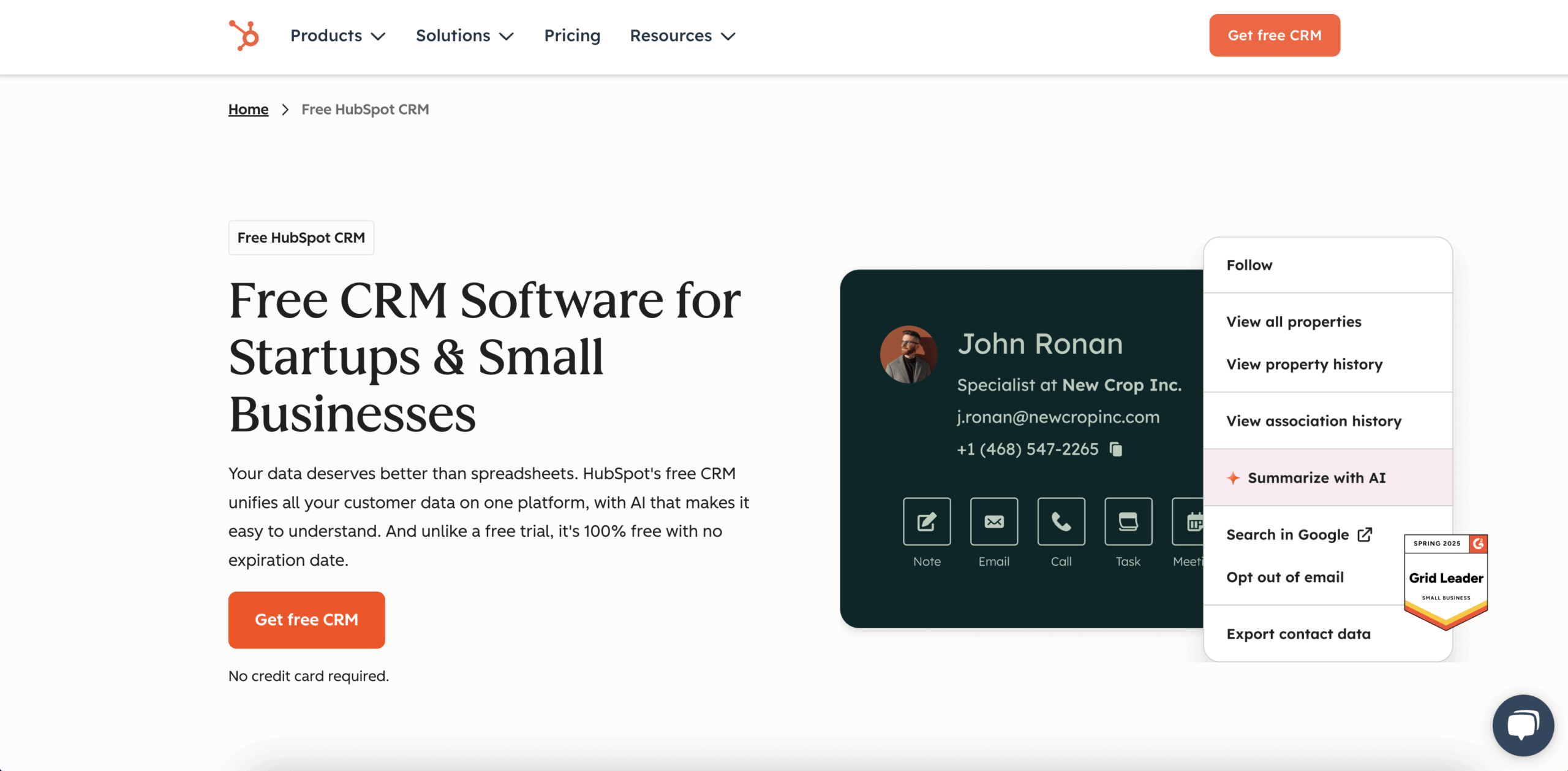
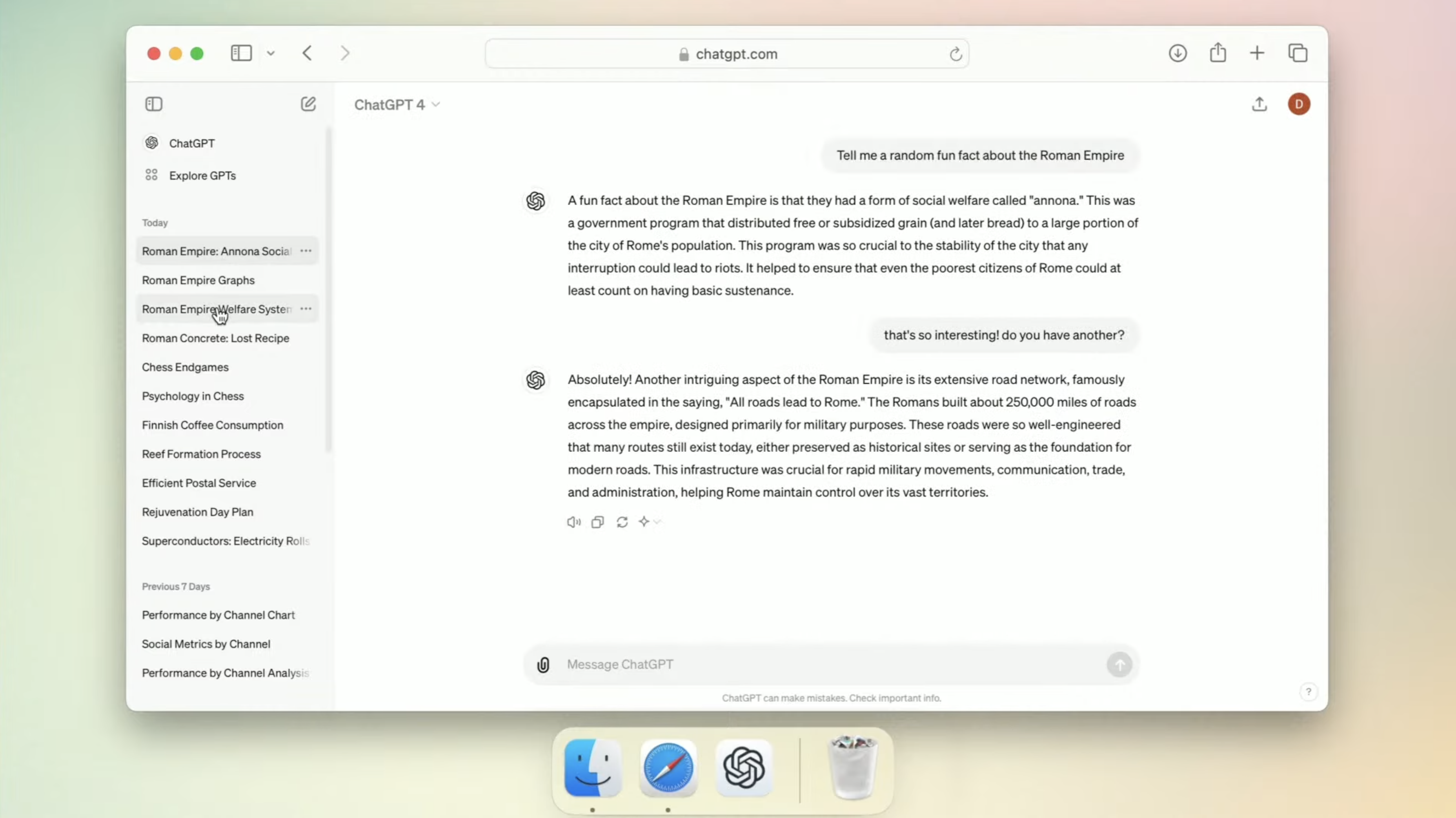


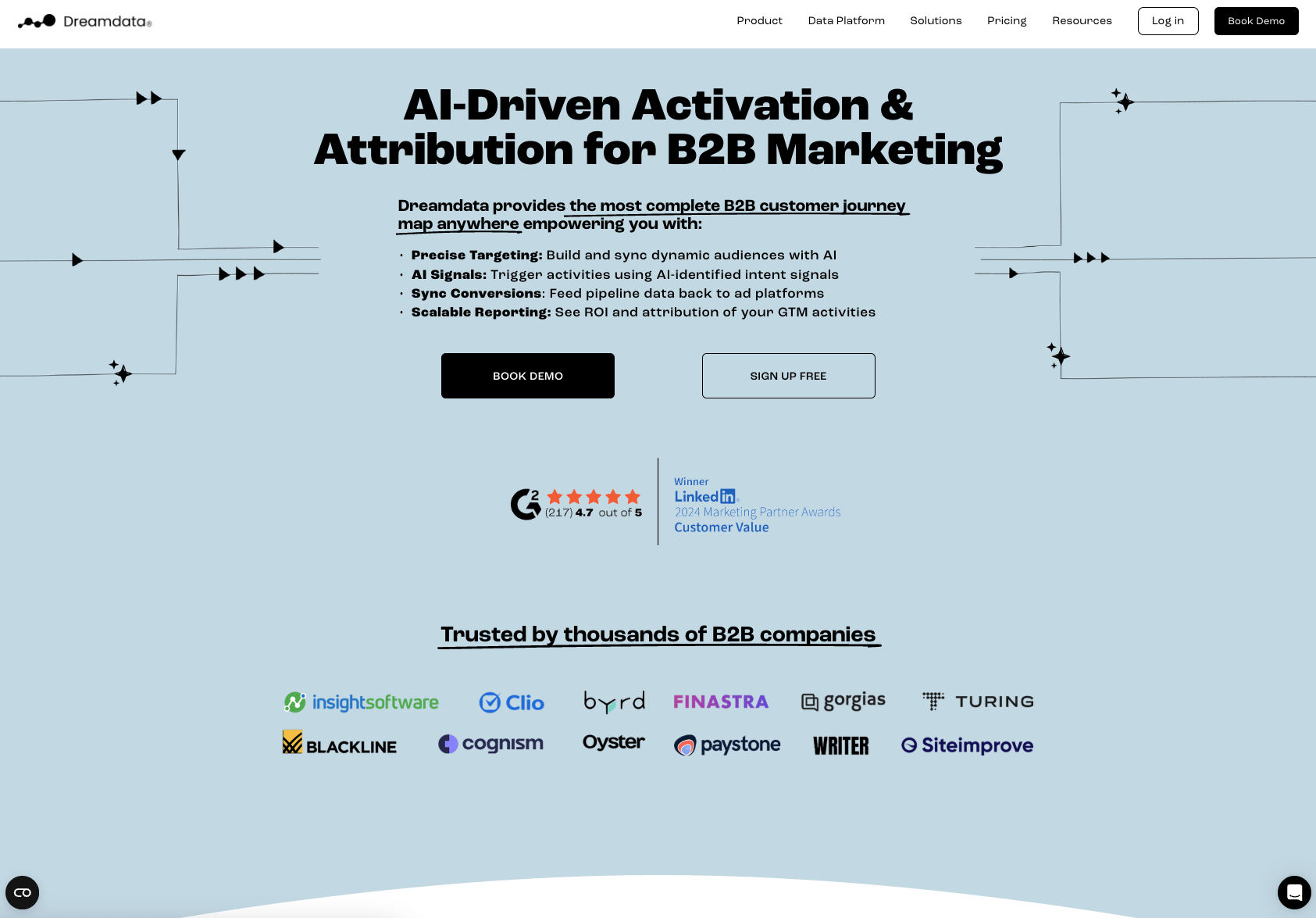
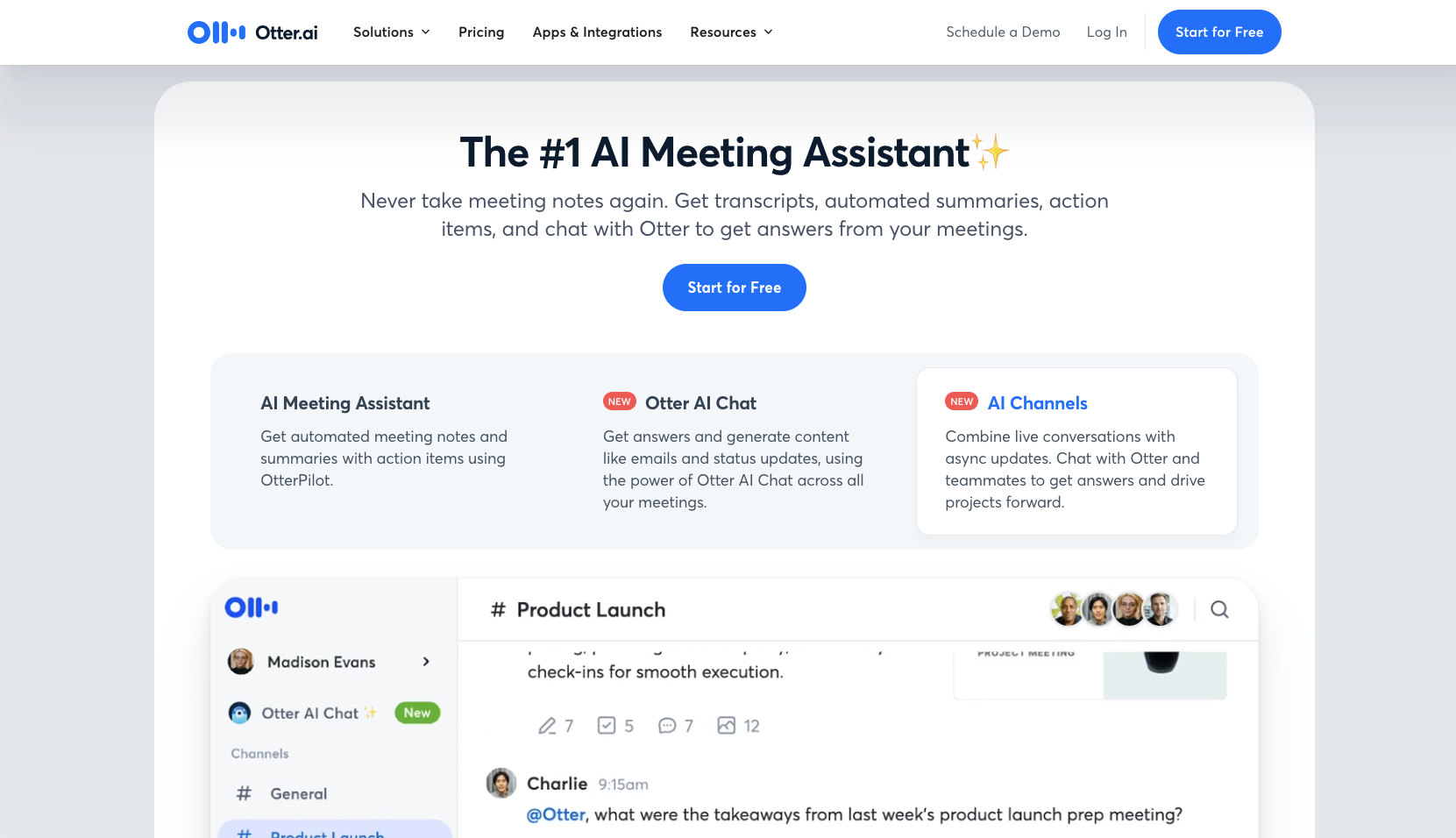

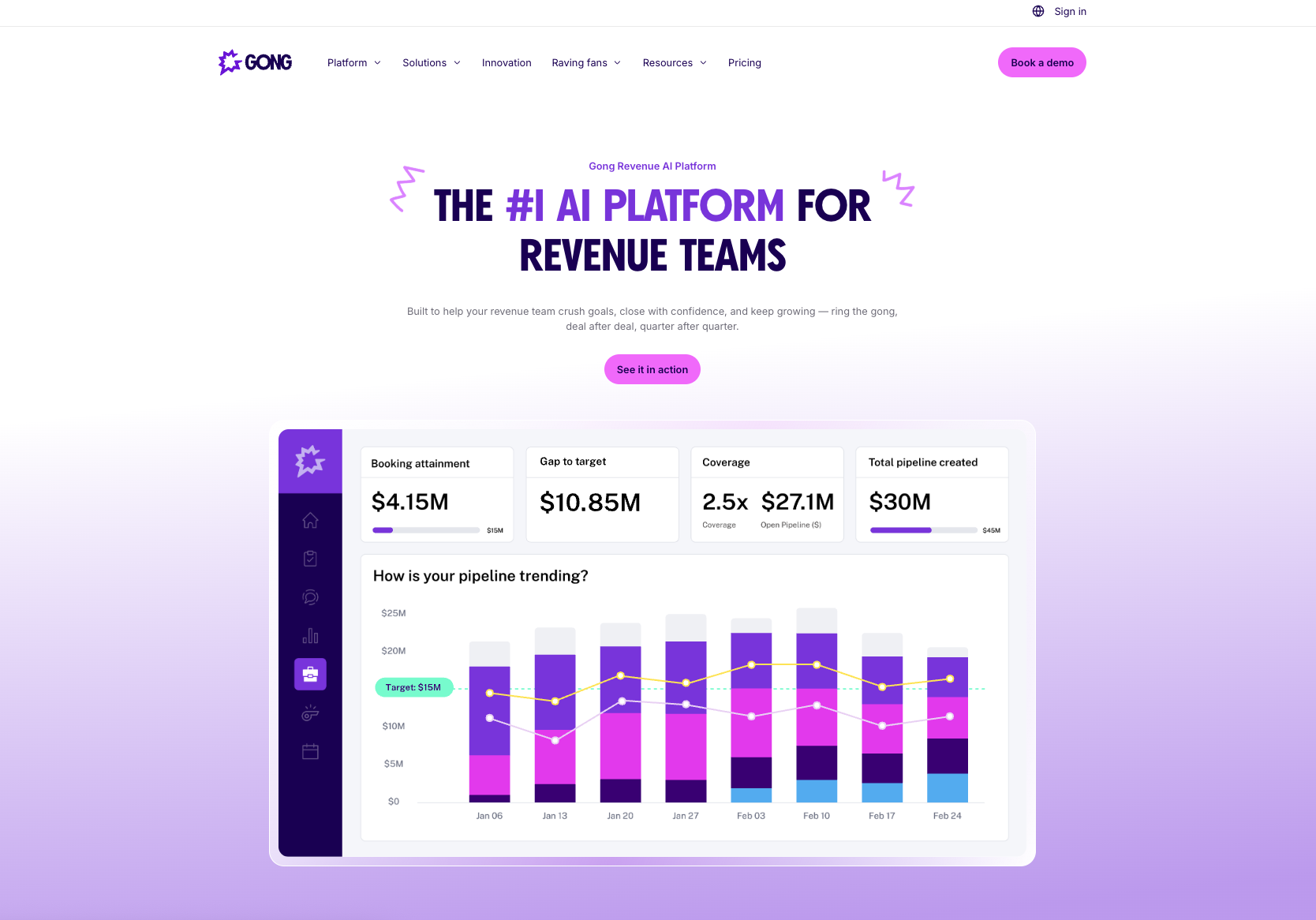
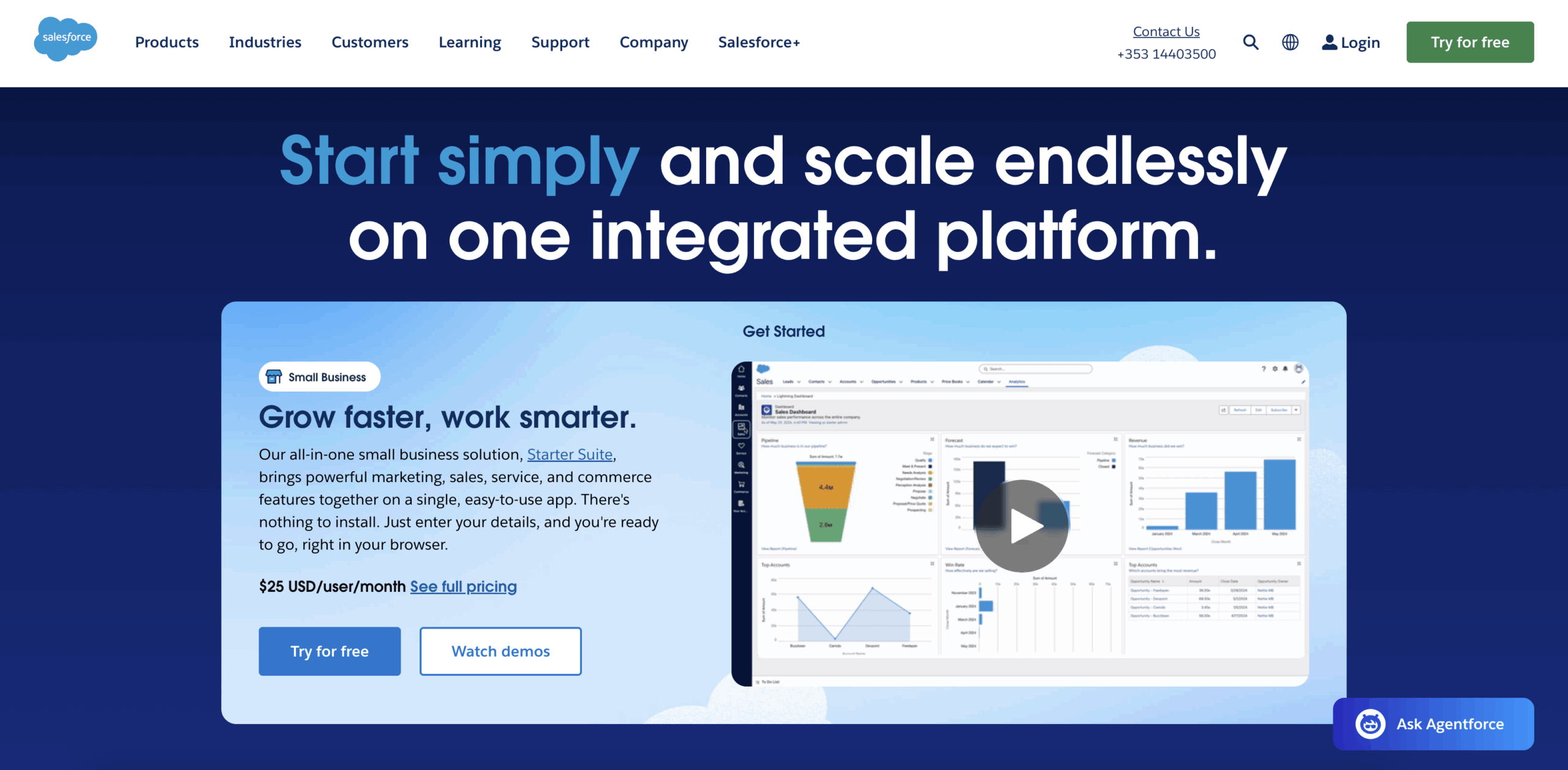






































































































Send Comment: